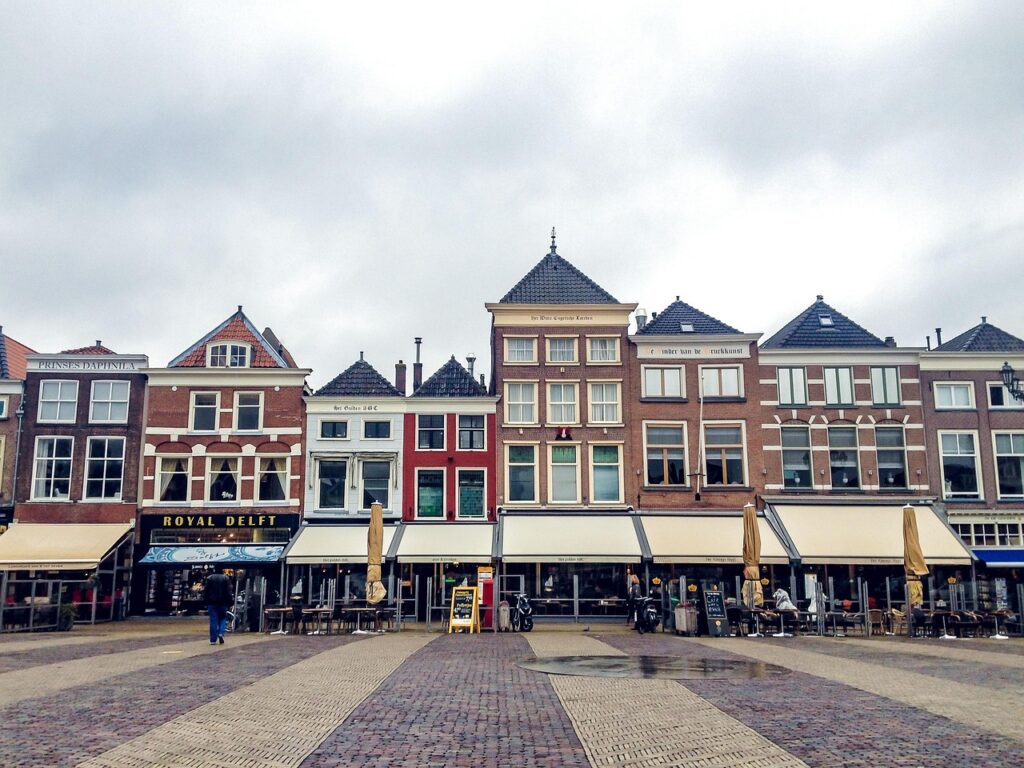Will the Netherlands be your place of higher education? The Netherlands’ cosmopolitan atmosphere and top-notch educational system make it a top choice for those looking to study abroad. For foreign students, studying in the Netherlands requires a student visa, especially those who do not originate from the European Union or the European Economic Area.
In this comprehensive guide, we will cover all aspects of the Netherlands student visa, from eligibility to the application process, required documents, costs, and tips to improve your chances of approval.

Study in the Netherlands: What Makes It Particular?
Before we dive into the details of visas, let’s take a brief look at why the Netherlands is a popular choice among international students:
-
Well esteemed educational institutions including the University of Amsterdam, Delft University of Technology, and Leiden University.
-
More than 2,000 different higher education programs are available in English.
-
When compared to other Western European countries, the cost of tuition is rather reasonable.
-
A warm, diverse, and secure setting for pupils.
-
Europe is a great place to go because of its central position.
Can You Enter the Netherlands Without a Student Visa?
Visa requirements to enter the Netherlands vary by nationality:
-
Neither a residence permit nor a student visa is required of Swiss or EU/EEA nationals.
-
In order to study in the Netherlands, students from non-EEA or EU countries need a resident permission (VVR) and a temporary residence permit (MVV).
Many Forms of Student Visas for the Netherlands
Without the proper authorisation, students from outside the EU or EEA often need two things:
1. Temporary Permit to Live (MVV): Machtiging tot Voorlopig Verblijf
More than 90 days of stay in the Netherlands is permissible with this long-stay visa.
2. A Residence Permit, also known as a VVR (Verblijfsvergunning Regulier)
This is the official green light for you to be a student. It is valid for the duration of your studies and includes a three-month period before and a three-month period after.
Who Submits the Application for Your Student Visa?
In most cases, the Dutch educational institution will apply for the visa on your behalf once you have been accepted into a full-time, accredited study program. A student visa application is not something you can do alone.
Criteria for Obtaining a Student Visa to the Netherlands
In order to study in the Netherlands, you need to meet these requirements:
-
The Letter of Acceptance
You must have an official offer from a top Dutch university. -
A current passport
You need to ensure that your passport is valid for a minimum of six months beyond your expected stay. -
Sufficient Means for Financial Support
You need to show that you can afford to live. Monthly living expenses in 2025 will amount to €1,200, according to the Immigration and Naturalisation Service (IND). It may be shown by:-
Financial records from individual banks
-
Statement of sponsorship with supporting financial documentation
-
Application materials for grants
-
-
Sometimes, check for TB
Depending on your country of origin, you could be required to have a tuberculosis test within three months of your arrival. -
Medical coverage
A valid student health insurance policy, either from the Netherlands or another country, is required. -
Progress in the Field of Study
Your residency permit will only be renewed if you keep up your good grades while you’re a student. It is often required that you earn half of the required credits annually.
Required Forms for a Student Visa to the Netherlands
Your school should be able to advise you on what paperwork is required. In most cases, you will need:
-
Your most recent passport in photo form
-
Justification for attending a Dutch school
-
Verification of sufficient financial means
-
Legalised and translated birth certificate (if needed)
-
Images that are passport-sized
-
If applicable, proof of tuition payment
-
Medical insurance certificate
-
Submitted their MVV and VVR applications
Procedures for Obtaining a Student Visa for the Netherlands
The following is an in-depth description:
Step 1: One must first get admission
Your application to a Dutch institution will culminate in an acceptance letter.
Step 2: Submit your university application
Your Dutch educational institution will submit your visa application to the IND.
Step 3: Pay the Visa fee
In 2025, a student visa to the Netherlands will cost around €228. Check with your school or the IND website to be sure of the exact price.
Step 4: Wait for the result
About sixty days is the typical timeframe for the IND to complete your application.
Step 5: Collect Your MVV
You will be instructed to collect your MVV visa sticker from the Dutch embassy or consulate in your home country after your application is approved.
Step 6: Go to the Netherlands and sign up
-
Get yourself registered with the city hall.
-
Retrieve your BSN, which stands for citizen service number.
-
You may get your residence permit (VVR) at the IND office.
What is the Duration of Validity for a Student Visa to the Netherlands?
The validity period of the student residential permit (VVR) is for the duration of the student’s program of study plus an additional three months for both pre- and post-graduation preparation.
While you’re executing:
-
It takes four years to get a bachelor’s degree.
-
Two years is the typical duration for a master’s degree.
-
Doctorate: no more than four years
Am I Able to Work While in the Netherlands on a Student Visa?
Under certain conditions, yes:
-
During the academic year, up to sixteen hours each week
-
Throughout the summer (from June through August)
-
It is your employer’s responsibility to get a work permit (TWV) for you
-
The registration and tax obligations make self-employment a difficult but feasible option
Attention: Students from the European Union and the European Economic Area are not limited in their ability to work.
Career Prospects After Graduation
You may apply for the “Orientation Year” residence permit (zoekjaar) after you graduate if you are an international student. This permit allows you to remain and search for job for up to 12 months.
-
Feel free to work as much as you like this year.
-
Applicants must submit their applications no later than three years after graduation.
-
If you get a job, you may switch to a highly skilled migrant visa.
Justifications for Denying a Student Visa
Here are some common reasons:
-
Not enough financial evidence
-
The paperwork is incomplete or wrong
-
Missing academic prerequisites
-
Have second thoughts about your plans to study
-
Lack of sufficient health insurance
Advice: Be sure your application is full and precise, and verify all criteria again.
Ways to Increase Your Probability of Obtaining a Student Visa to Europe
-
Initiate the application procedure as soon as you are admitted
-
Get Your Money Matters in Order—Have proof of at least a year’s worth of spending stashed away
-
Plan Ahead—Buy Dutch-compliant health insurance as soon as possible
-
Contact the International Office at Your University Regularly
-
Make sure everything is in order by translating and legalising any necessary foreign paperwork
Dutch Living Expenses in the Year 2025
Although the cost of tuition is reasonable, the cost of living might differ. This is how it is broken down:
| Monthly Expense | Estimate in Euros |
|---|---|
| Spaces available | 400–700 |
| Consumables | 150–300 |
| From fifty to one hundred | 50–100 |
| Coverage range | 100–120 |
| Various/Recreational | 100–200 |
| Total | €1,000 – €1,400 |
Can Your Family Travel with You on an Academic Visa?
Yes. Family reunification residence permits allow you to bring your children and spouses together, but you’ll need to show that you have the money to pay for their support.
Conclusion
Obtaining a student visa to study in the Netherlands is easier than you think if you put in the time and effort to prepare ahead of time. The country provides a world-class education, a welcoming atmosphere for foreign students, and exciting job options after graduation.
Maintain regular communication with your Dutch university and keep yourself apprised of any changes to the IND (Immigration and Naturalisation Service) legislation. If you are well-prepared and have the correct advice, studying in the Netherlands may be a very rewarding experience.
The Most Common Questions Regarding the Student Visa for the Netherlands
1. Am I allowed to bring my partner or husband with me to the Netherlands to study?
It is possible, but you will have to apply for their residency visa and provide proof of adequate income.
2. After finishing school, would I be able to seek for permanent residency?
Eligibility is contingent upon a minimum of five years of continuous legal residency, which includes employment after graduation.
3. Do brief educational programs need a visa?
A short-stay Schengen visa can be enough if the duration of the course is less than 90 days. Get in touch with your school.
4. How much time is required to process a visa?
Typically, it takes around 60 days, although getting a head start is always preferable.
5. If I am unable to finish my education, what will happen?
Failure to satisfy the standards for academic advancement may result in the revocation of your residence visa.
